Note: This question is different from Fastest way to calculate a 128-bit integer modulo a 64-bit integer.
Here's a C# fiddle:
https://dotnetfiddle.net/QbLowb
Given the pseudocode:
UInt64 a = 9228496132430806238;
UInt32 d = 585741;
How do i calculate
UInt32 r = a % d?
The catch, of course, is that i am not in a compiler that supports the UInt64 data type.1 But i do have access to the Windows ULARGE_INTEGER union:
typedef struct ULARGE_INTEGER {
DWORD LowPart;
DWORD HighPart;
};
Which means really that i can turn my code above into:
//9228496132430806238 = 0x80123456789ABCDE
UInt32 a = 0x80123456; //high part
UInt32 b = 0x789ABCDE; //low part
UInt32 r = 585741;
How to do it
But now comes how to do the actual calculation. I can start with the pencil-and-paper long division:
________________________
585741 ) 0x80123456 0x789ABCDE
To make it simpler, we can work in variables:
Now we are working entirely with 32-bit unsigned types, which my compiler does support.
u1 = a / r; //integer truncation math
v1 = a % r; //modulus
But now i've brought myself to a standstill. Because now i have to calculate:
v1||b / r
In other words, I have to perform division of a 64-bit value, which is what i was unable to perform in the first place!
This must be a solved problem already. But the only questions i can find on Stackoverflow are people trying to calculate:
a^b mod n
or other cryptographically large multi-precision operations, or approximate floating point.
Bonus Reading
- Microsoft Research: Division and Modulus for Computer Scientists
- https://stackoverflow.com/questions/36684771/calculating-large-mods-by-hand
- Fastest way to calculate a 128-bit integer modulo a 64-bit integer (unrelated question; i hate you people)
1But it does support Int64, but i don't think that helps me
Working with Int64 support
I was hoping for the generic solution to the performing modulus against a ULARGE_INTEGER (and even LARGE_INTEGER), in a compiler without native 64-bit support. That would be the correct, good, perfect, and ideal answer, which other people will be able to use when they need.
But there is also the reality of the problem i have. And it can lead to an answer that is generally not useful to anyone else:
- cheating by calling one of the Win32 large integer functions (although there is none for modulus)
- cheating by using 64-bit support for signed integers
I can check if a is positive. If it is, i know my compiler's built-in support for Int64 will handle:
UInt32 r = a % d; //for a >= 0
Then there's there's how to handle the other case: a is negative
UInt32 ModU64(ULARGE_INTEGER a, UInt32 d)
{
//Hack: Our compiler does support Int64, just not UInt64.
//Use that Int64 support if the high bit in a isn't set.
Int64 sa = (Int64)a.QuadPart;
if (sa >= 0)
return (sa % d);
//sa is negative. What to do...what to do.
//If we want to continue to work with 64-bit integers,
//we could now treat our number as two 64-bit signed values:
// a == (aHigh + aLow)
// aHigh = 0x8000000000000000
// aLow = 0x0fffffffffffffff
//
// a mod d = (aHigh + aLow) % d
// = ((aHigh % d) + (aLow % d)) % d //<--Is this even true!?
Int64 aLow = sa && 0x0fffffffffffffff;
Int64 aHigh = 0x8000000000000000;
UInt32 rLow = aLow % d; //remainder from low portion
UInt32 rHigh = aHigh % d; //this doesn't work, because it's "-1 mod d"
Int64 r = (rHigh + rLow) % d;
return d;
}
Answer
It took a while, but i finally got an answer. I would post it as an answer; but Z29kIGZ1Y2tpbmcgZGFtbiBzcGVybSBidXJwaW5nIGNvY2tzdWNraW5nIHR3YXR3YWZmbGVz people mistakenly decided that my unique question was an exact duplicate.
UInt32 ModU64(ULARGE_INTEGER a, UInt32 d)
{
//I have no idea if this overflows some intermediate calculations
UInt32 Al = a.LowPart;
UInt32 Ah = a.HighPart;
UInt32 remainder = (((Ah mod d) * ((0xFFFFFFFF - d) mod d)) + (Al mod d)) mod d;
return remainder;
}



